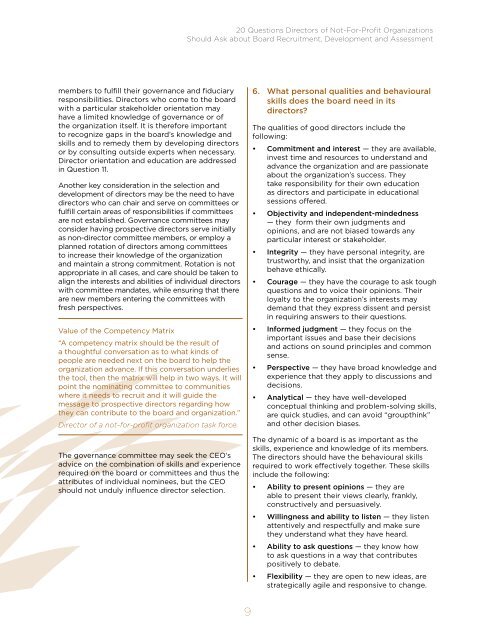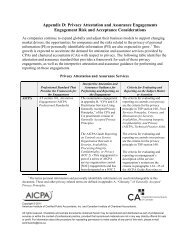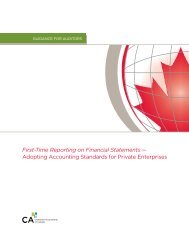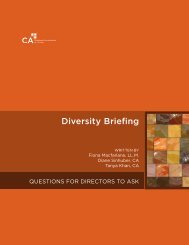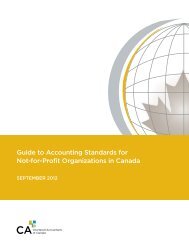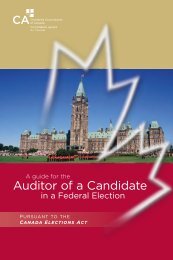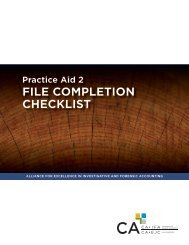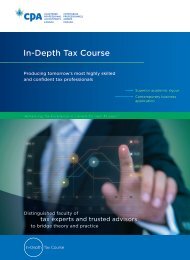20 Questions Directors of Not-for-Profit Organizations Should Ask ...
20 Questions Directors of Not-for-Profit Organizations Should Ask ...
20 Questions Directors of Not-for-Profit Organizations Should Ask ...
You also want an ePaper? Increase the reach of your titles
YUMPU automatically turns print PDFs into web optimized ePapers that Google loves.
<strong>20</strong> <strong>Questions</strong> <strong>Directors</strong> <strong>of</strong> <strong>Not</strong>-For-Pr<strong>of</strong>it <strong>Organizations</strong><br />
<strong>Should</strong> <strong>Ask</strong> about Board Recruitment, Development and Assessment<br />
members to fulfill their governance and fiduciary<br />
responsibilities. <strong>Directors</strong> who come to the board<br />
with a particular stakeholder orientation may<br />
have a limited knowledge <strong>of</strong> governance or <strong>of</strong><br />
the organization itself. It is there<strong>for</strong>e important<br />
to recognize gaps in the board’s knowledge and<br />
skills and to remedy them by developing directors<br />
or by consulting outside experts when necessary.<br />
Director orientation and education are addressed<br />
in Question 11.<br />
Another key consideration in the selection and<br />
development <strong>of</strong> directors may be the need to have<br />
directors who can chair and serve on committees or<br />
fulfill certain areas <strong>of</strong> responsibilities if committees<br />
are not established. Governance committees may<br />
consider having prospective directors serve initially<br />
as non-director committee members, or employ a<br />
planned rotation <strong>of</strong> directors among committees<br />
to increase their knowledge <strong>of</strong> the organization<br />
and maintain a strong commitment. Rotation is not<br />
appropriate in all cases, and care should be taken to<br />
align the interests and abilities <strong>of</strong> individual directors<br />
with committee mandates, while ensuring that there<br />
are new members entering the committees with<br />
fresh perspectives.<br />
Value <strong>of</strong> the Competency Matrix<br />
“A competency matrix should be the result <strong>of</strong><br />
a thoughtful conversation as to what kinds <strong>of</strong><br />
people are needed next on the board to help the<br />
organization advance. If this conversation underlies<br />
the tool, then the matrix will help in two ways. It will<br />
point the nominating committee to communities<br />
where it needs to recruit and it will guide the<br />
message to prospective directors regarding how<br />
they can contribute to the board and organization.”<br />
Director <strong>of</strong> a not-<strong>for</strong>-pr<strong>of</strong>it organization task <strong>for</strong>ce.<br />
The governance committee may seek the CEO’s<br />
advice on the combination <strong>of</strong> skills and experience<br />
required on the board or committees and thus the<br />
attributes <strong>of</strong> individual nominees, but the CEO<br />
should not unduly influence director selection.<br />
6.<br />
What personal qualities and behavioural<br />
skills does the board need in its<br />
directors<br />
The qualities <strong>of</strong> good directors include the<br />
following:<br />
• Commitment and interest — they are available,<br />
invest time and resources to understand and<br />
advance the organization and are passionate<br />
about the organization’s success. They<br />
take responsibility <strong>for</strong> their own education<br />
as directors and participate in educational<br />
sessions <strong>of</strong>fered.<br />
• Objectivity and independent-mindedness<br />
— they <strong>for</strong>m their own judgments and<br />
opinions, and are not biased towards any<br />
particular interest or stakeholder.<br />
• Integrity — they have personal integrity, are<br />
trustworthy, and insist that the organization<br />
behave ethically.<br />
• Courage — they have the courage to ask tough<br />
questions and to voice their opinions. Their<br />
loyalty to the organization’s interests may<br />
demand that they express dissent and persist<br />
in requiring answers to their questions.<br />
• In<strong>for</strong>med judgment — they focus on the<br />
important issues and base their decisions<br />
and actions on sound principles and common<br />
sense.<br />
• Perspective — they have broad knowledge and<br />
experience that they apply to discussions and<br />
decisions.<br />
• Analytical — they have well-developed<br />
conceptual thinking and problem-solving skills,<br />
are quick studies, and can avoid “groupthink”<br />
and other decision biases.<br />
The dynamic <strong>of</strong> a board is as important as the<br />
skills, experience and knowledge <strong>of</strong> its members.<br />
The directors should have the behavioural skills<br />
required to work effectively together. These skills<br />
include the following:<br />
• Ability to present opinions — they are<br />
able to present their views clearly, frankly,<br />
constructively and persuasively.<br />
• Willingness and ability to listen — they listen<br />
attentively and respectfully and make sure<br />
they understand what they have heard.<br />
• Ability to ask questions — they know how<br />
to ask questions in a way that contributes<br />
positively to debate.<br />
• Flexibility — they are open to new ideas, are<br />
strategically agile and responsive to change.<br />
9


